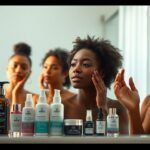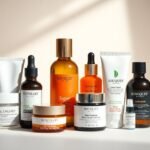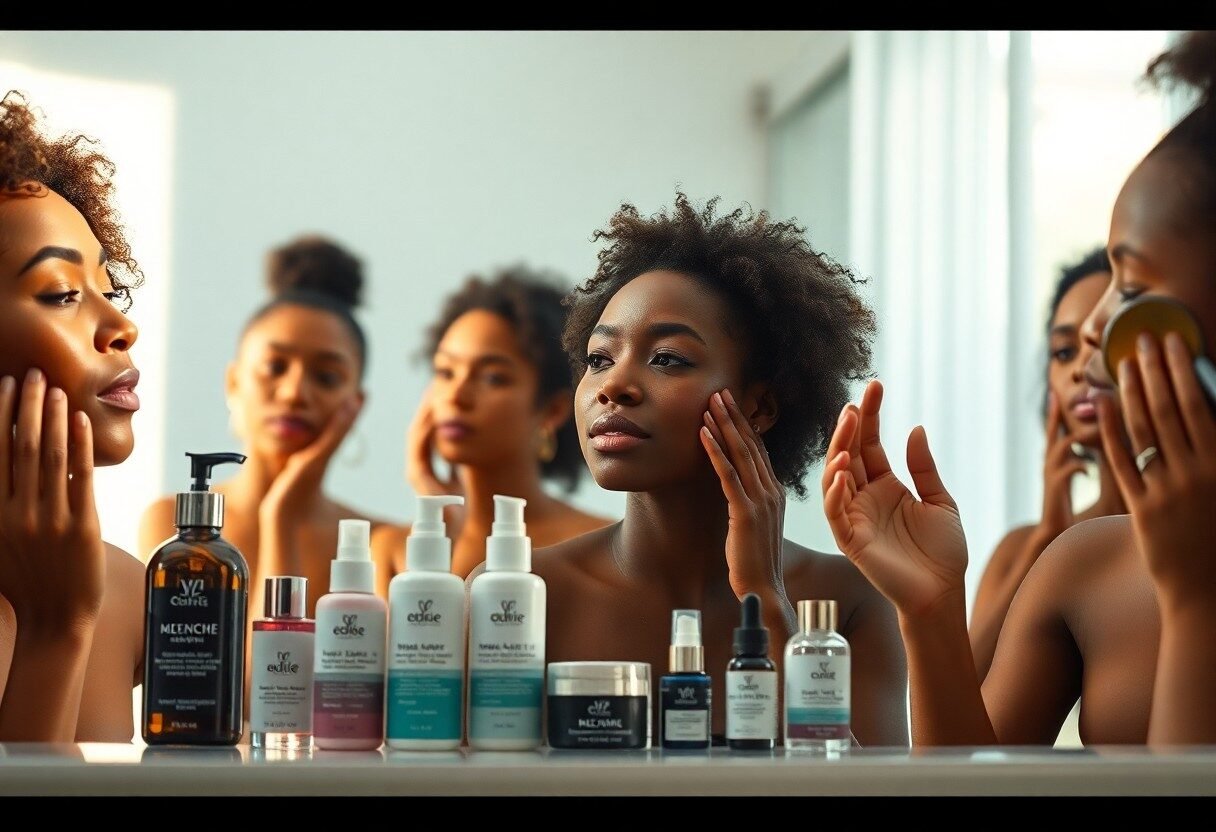
Black women often face unique challenges when it comes to hormonal acne, and finding the right skincare products can make all the difference. In this blog post, I will share effective strategies and recommendations tailored specifically for your skin type, helping you navigate the complexities of hormonal breakouts. By understanding the specific needs of your beautiful skin, we can tackle acne effectively while promoting overall skin health. Let’s look into the products that can transform your skincare routine and restore your confidence.
Key Takeaways:
- Target products that contain salicylic acid, benzoyl peroxide, or alpha hydroxy acids to help exfoliate and unclog pores.
- Incorporate gentle, hydrating ingredients like hyaluronic acid and glycerin to balance moisture levels in the skin, especially when using stronger treatments.
- Look for non-comedogenic products to prevent pore blockage, which can worsen acne breakouts.
- Consider oils like tea tree or rosehip, known for their anti-inflammatory properties, to soothe skin and reduce redness.
- Use sunscreen daily to protect skin, as some acne treatments can increase sensitivity to the sun.
- Consult with a dermatologist to customize your regimen based on skin type, as hormonal acne can vary greatly among individuals.
- Patience is key; it may take time to see results, so consistency in applying skincare products is imperative for managing hormonal acne.
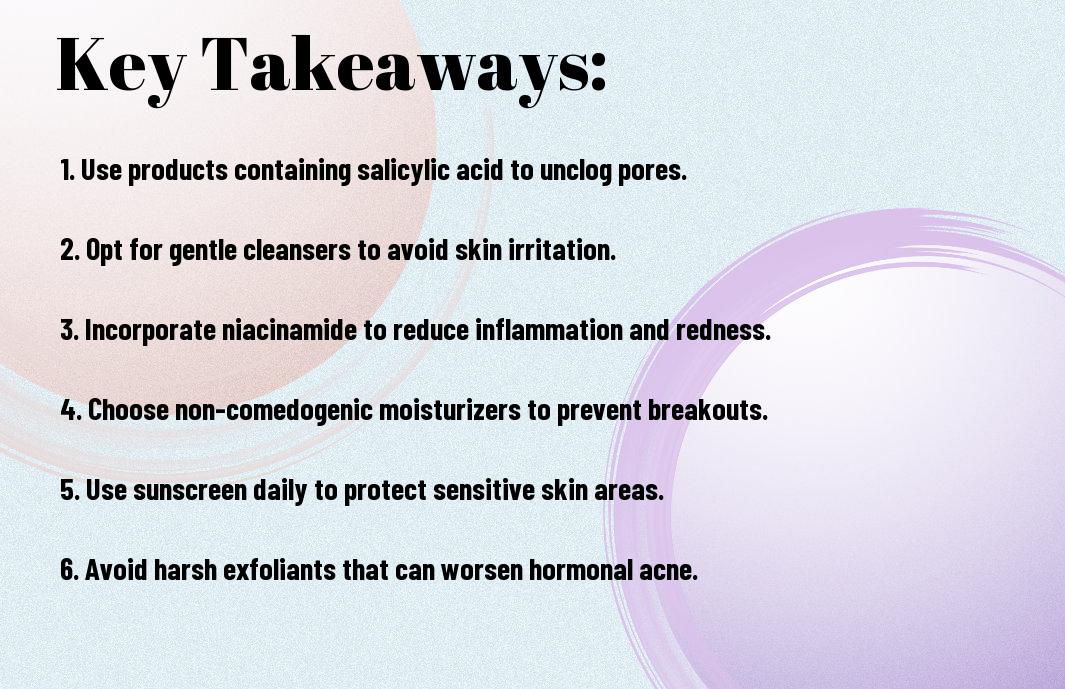
Decoding the Unique Characteristics of Hormonal Acne in Black Women
Hormonal acne manifests differently among Black women, often presenting as deep, cystic lesions that can become more inflamed due to our unique skin structure. The tendency for post-inflammatory hyperpigmentation means that even after the acne clears, dark spots may linger, making treatment more challenging. This requires a tailored skincare approach that addresses both the acne itself and the resulting discoloration, ensuring that your regimen is effective yet gentle on your skin.
The Impact of Hormonal Fluctuations
Fluctuations in hormones during menstrual cycles, pregnancy, or menopause can trigger increased oil production, leading to hormonal acne. This often results in breakouts along the jawline and chin, areas particularly sensitive to hormonal changes. You might find that certain times of the month exacerbate your condition, highlighting the importance of monitoring your skin’s response to hormonal shifts.
Cultural and Genetic Considerations in Skin Response
Your skin’s response to hormonal acne isn’t just about your hormones; cultural and genetic factors play significant roles too. I noticed that among Black women, skin tends to have a denser structure, which can make it more susceptible to specific types of inflammation and scarring. Additionally, genetic predispositions to conditions like polycystic ovary syndrome (PCOS) can increase the likelihood of experiencing hormonal acne, emphasizing the need for a comprehensive understanding of individual skin types when seeking treatments.
The interplay of culture and genetics in how your skin responds to hormonal acne is profound. For instance, studies indicate that Black individuals have a higher melanocyte density, meaning that hyperpigmentation after acne lesions can develop more rapidly and prominently. Additionally, cultural attitudes towards skincare may influence product choices, impacting the overall effectiveness of treatments. Customizing your skincare routine to not only target the acne but also the unique healing process of your skin can make all the difference in managing flare-ups effectively.
Formulating an Effective Skincare Regimen
Establishing a consistent skincare regimen is imperative for combating hormonal acne. Start with a gentle cleanser to eliminate impurities without stripping natural oils. Incorporate targeted treatments like serums that contain *salicylic acid* or *benzoyl peroxide*, followed by a light, non-comedogenic moisturizer. You’ll also want to introduce treatments featuring *retinol* or *alpha hydroxy acids* (AHAs) to promote cell turnover. Always finish with sunscreen during the day to protect your skin and prevent post-inflammatory hyperpigmentation, common in Black women.
Key Ingredients That Work for Oily and Acne-Prone Skin
For oily and acne-prone skin, focusing on products that feature salicylic acid, niacinamide, and tea tree oil can be beneficial. Salicylic acid exfoliates inside the pores, effectively reducing the likelihood of breakouts. Niacinamide regulates oil production and soothes inflammation, while tea tree oil offers natural antibacterial properties. These ingredients can help to maintain a clearer complexion, especially when used in conjunction with a consistent skincare regimen.
The Role of Moisturizers in Acne Management
Many people fear that moisturizing will exacerbate oily skin or lead to more breakouts. However, using the right moisturizer is fundamental in acne management. Opting for a lightweight, oil-free, and non-comedogenic formula can keep your skin hydrated without contributing to clogged pores. Moisturizers containing *hyaluronic acid* or *gel-based* textures can balance moisture levels while allowing your skin to breathe and regulate oil production. Proper hydration can also promote healing and prevent the dryness and irritation that often accompany acne treatments.
Tailoring Treatments: Product Recommendations
Targeting hormonal acne effectively requires carefully chosen products that cater to both your skin type and specific concerns. Picking the right ingredients, such as salicylic acid for unclogging pores and niacinamide for improved skin texture is crucial. Additionally, considering your skin’s unique needs ensures a tailored approach that can reduce breakouts while promoting an even complexion. Here are some top product recommendations that have proven effective for many.
The Best Cleansers to Combat Clogged Pores
In the quest for clear skin, a high-quality cleanser is your first line of defense against clogged pores. Look for cleansers that contain salicylic acid or benzoyl peroxide, both of which effectively break down oil and prevent acne formation. Gentle formulations like CeraVe Foaming Facial Cleanser or Neutrogena Oil-Free Acne Wash remove impurities without stripping your skin of moisture. Remember to cleanse your face twice a day for optimal results.
Spot Treatments Versus Full-Face Solutions
Knowing when to use spot treatments versus a full-face solution can make a significant difference in your acne management. Spot treatments are concentrated formulas designed to tackle specific blemishes with active ingredients like benzoyl peroxide or tea tree oil. On the other hand, full-face solutions aim to maintain overall skin health and prevent new breakouts by utilizing ingredients like retinol and niacinamide. Selecting the right treatment depends on your current skin condition; spot treatments are ideal for isolated breakouts, while full-face products can help prevent future occurrences.
Choosing between spot treatments and full-face solutions hinges on the nature of your breakouts. For sudden, painful pimples, spot treatments deliver rapid results directly to the affected area, often within a day or two. They contain higher concentrations of active ingredients specifically designed to penetrate pores and reduce inflammation. Conversely, full-face treatments maintain a preventative routine that promotes an overall healthy skin barrier. Utilizing both in your regimen can strike the right balance, allowing you to address immediate blemishes while fostering long-term skin health.
Beyond Products: Lifestyle Adjustments That Help
In addition to using the right skincare products, lifestyle changes can significantly enhance the health of your skin and balance hormones. Integrating healthy habits can create a supportive environment for your skin, which is necessary when combating hormonal acne. Adopting a holistic approach, which includes mindful eating, stress management, and adequate sleep, can lead to a noticeable improvement in your skin’s overall condition. Understanding how these factors interact with your hormonal health paves the way for more effective acne management.
Dietary Influences on Hormonal Balance
Your diet plays a pivotal role in maintaining hormonal balance, which can directly influence acne breakouts. Incorporating anti-inflammatory foods such as leafy greens, berries, and omega-3 rich fish can reduce inflammation and promote skin health. It’s also wise to limit high-glycemic foods and dairy, as they can trigger hormone fluctuations and exacerbate acne symptoms. A balanced diet not only nourishes your body but also positively affects your skin’s complexion.
Stress Management Techniques and Their Effects on Skin
High levels of stress can trigger hormonal fluctuations that lead to increased acne production. Techniques such as yoga, meditation, and regular exercise can effectively manage stress and lower cortisol levels. Establishing a daily practice of mindfulness can help you become more attuned to your emotional state and skin condition. If you find yourself overwhelmed, consider scheduling ‘me time’ to regroup and recharge, ultimately translating into healthier skin.
Stress management is more than just relaxation techniques; it involves creating a balanced lifestyle that accommodates emotional well-being. For instance, a study found that individuals practicing mindfulness meditation reported a 60% reduction in stress levels over time, which corresponded with fewer acne flare-ups. Regular physical activity not only serves as an outlet for pent-up energy but also increases circulation, promoting skin healing and resilience. By incorporating even a few minutes of mindfulness or exercise daily, you can foster a calmer state of mind that benefits your skin.
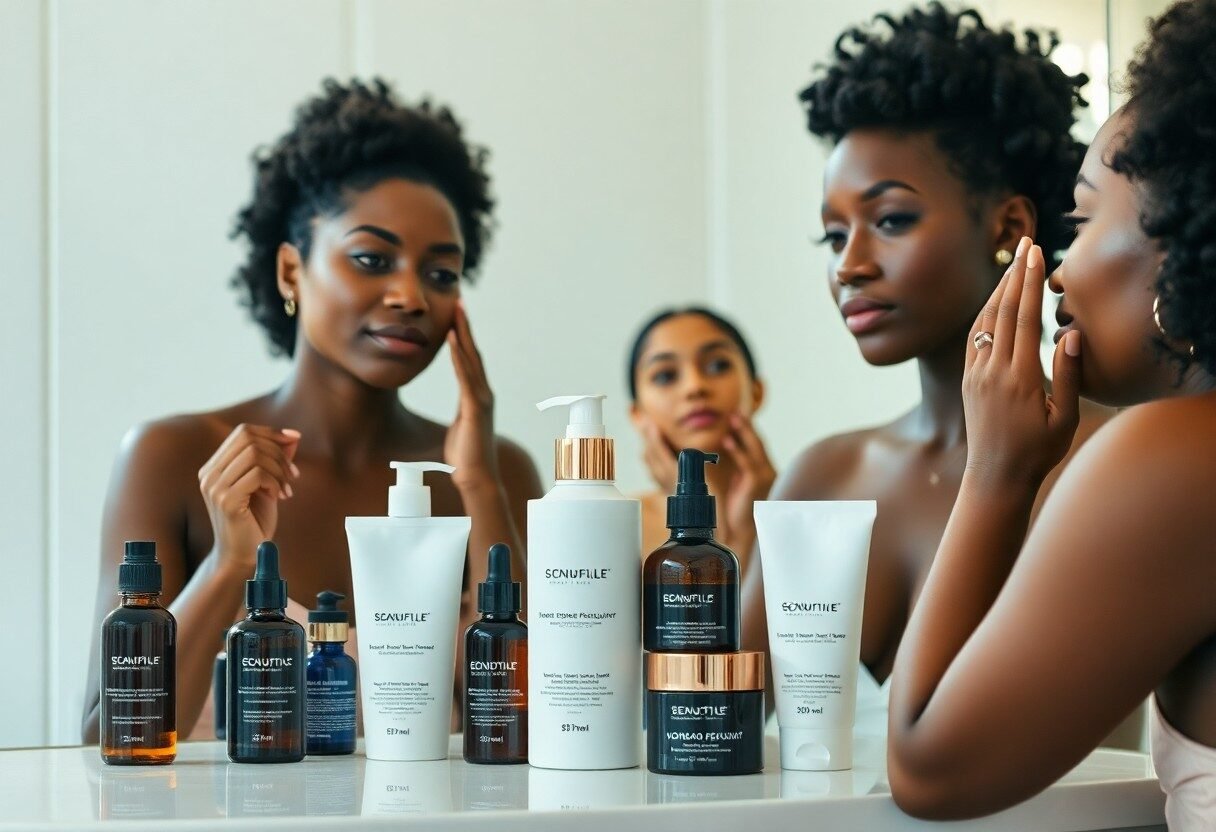
Expert Insights: Dermatologists Weigh In
Listening to dermatologists can provide insight into combating hormonal acne. Many experts agree that while genetics plays a role in our skin’s behavior, targeted treatments can alleviate challenges unique to Black women. Dermatologist Dr. Michelle Henry emphasizes the importance of understanding your own skin’s texture and tone. Products containing salicylic acid or benzoyl peroxide can be particularly effective, but having a regimen tailored to your needs can yield the best results.
Common Myths About Hormonal Acne and Black Skin
A number of myths surround hormonal acne and its effects on Black skin. One prevalent misconception is that darker skin is less susceptible to acne scars. In reality, post-inflammatory hyperpigmentation is a common aftermath of breakouts in Black individuals. This means that untreated hormonal acne can lead to darker spots on your skin, making proactive treatment crucial.
Professional Treatments Versus Over-the-Counter Solutions
When evaluating treatments for hormonal acne, it’s vital to weigh the benefits of professional interventions against over-the-counter solutions. While OTC products can be effective for mild cases, more severe hormonal acne may require specialized care from a dermatologist. They might recommend treatments like chemical peels, laser therapy, or prescription medications that address the root causes of your breakouts, offering targeted relief.
For instance, professional treatments often include oral contraceptives or spironolactone, which regulate hormones directly contributing to acne. Many find this approach surprisingly beneficial, especially when OTC products fail to deliver satisfactory results. Detailed assessments of your skin can ensure that you receive personalized scaffolding—beyond what general products provide. Investing in professional care can save time and anxiety in the long run, making it a valuable consideration for anyone struggling with hormonal acne.
Final Words
From above, I’ve shared effective strategies for treating hormonal acne specifically for Black women using the right skincare products. As you navigate your skincare journey, prioritize ingredients that target your unique skin needs, such as salicylic acid and niacinamide, while being mindful of the effects of hormonal fluctuations. Your skin’s health is a journey, and by understanding how to cater to it, you can achieve clearer, radiant skin. Embrace the process, and I’m confident you’ll find the products that work best for you.
FAQ
Q: What is hormonal acne, and how does it affect Black women differently?
A: Hormonal acne is a type of acne that results from fluctuations in hormone levels, often tied to menstrual cycles, pregnancy, or polycystic ovarian syndrome (PCOS). Black women may experience this condition differently due to variations in skin texture, oil production, and genetic predispositions, which can lead to different types of breakouts and pigmentation issues associated with acne.
Q: What skincare ingredients should Black women look for when treating hormonal acne?
A: Black women should consider products containing salicylic acid, glycolic acid, niacinamide, and benzoyl peroxide. These ingredients help unclog pores, reduce inflammation, and fade dark spots. Additionally, soothing ingredients like aloe vera and tea tree oil can also be beneficial for calming irritated skin.
Q: Are there specific products that are best for treating hormonal acne in black skin?
A: Yes, products that are non-comedogenic and formulated specifically for oily or acne-prone skin are ideal. Look for gel-based moisturizers and lightweight serums. Brands like CeraVe, La Roche-Posay, and Black Girl Sunscreen have options tailored for darker skin tones while addressing acne concerns.
Q: How can I prevent scarring after experiencing hormonal acne?
A: To prevent scarring, it is important to avoid picking or popping pimples. Incorporating products with ingredients like retinol or vitamin C can also aid in skin renewal and fading dark spots. Always ensure proper sun protection, as UV exposure can darken existing scars.
Q: How often should I use acne treatment products on my skin?
A: It is advisable to start slowly by incorporating acne treatment products into your routine 2-3 times a week to assess how your skin reacts. If your skin tolerates them well, you can gradually increase usage. Always follow the instructions provided and pay attention to any sign of irritation.
Q: Is it necessary to consult a dermatologist for hormonal acne treatment?
A: While many can manage hormonal acne with over-the-counter products, consulting a dermatologist is beneficial for persistent cases. A dermatologist can prescribe stronger medications, assess hormonal imbalances, and provide personalized skincare regimens suited to individual skin types and concerns.
Q: What lifestyle changes can help reduce hormonal acne in Black women?
A: Implementing a consistent skincare routine, staying hydrated, reducing stress through activities like yoga or meditation, and maintaining a balanced diet rich in whole foods can help manage hormonal acne. Additionally, avoiding heavy makeup and ensuring you cleanse your face thoroughly can help keep pores clear.
